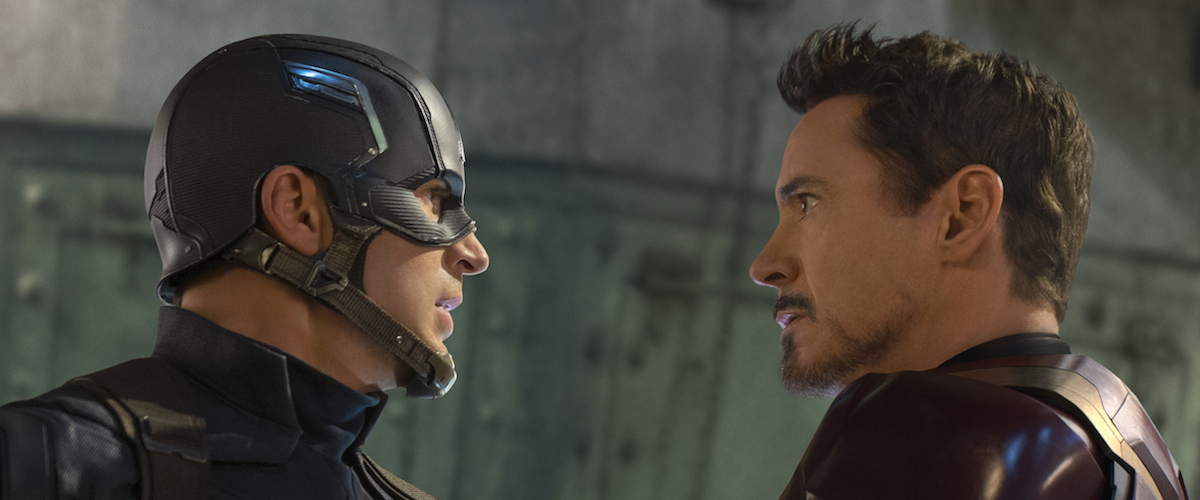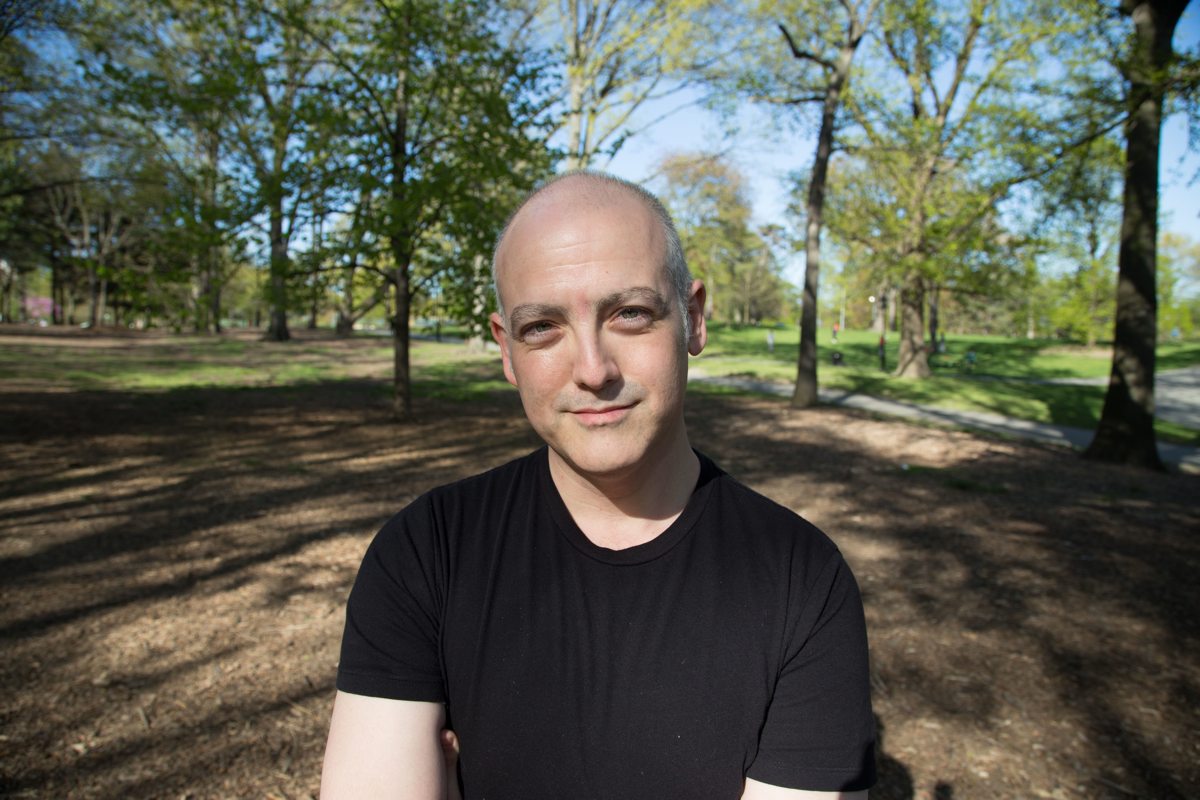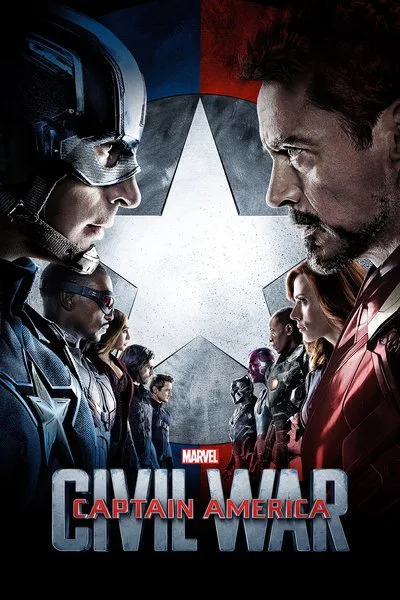The bad news is, there are about ten movies going on in "Captain America: Civil War," which is at least seven too many. The good news is, most of them are fun, and there are enough rousing moments to elevate the movie to Marvel's top tier.
Although Thor, the Hulk and other recurring characters have gone missing this time (with somewhat vague explanations for their absence), nobody's going to mistake "Civil War" for a chamber piece. Trailers sold this installment as a tale of intra-Avengers warfare, set off by the government's demand that Captain America (Chris Evans) allow the arrest of his old friend The Winter Soldier, aka Bucky Barnes (Sebastian Stan), an assassin whose moral compass has been scrambled by brainwashing, so that he can be punished for his presumed role in a terrorist attack. And it is that. But only some of the time.
There are more than a dozen major characters and another dozen minor ones, including Black Panther (Chadwick Boseman) and Spider-Man (Tom Holland), all running, flying, stomping and blasting through a long, lumpy story inspired by the 2006 Civil War graphic novel arc. Thematically, it's potluck. Like "Avengers: The Age of Ultron," "Captain America: The Winter Soldier" and "Iron Man 3," "Civil War" is simultaneously about the ramifications of US intervention in a post-9/11 world; the responsibility of private military contractors (which is basically what the Avengers are here) to defer to their government and the United Nations; the question of whether civilian casualties negate the righteousness of a noble mission; the allure and price of vengeance; and individuals' ongoing, never-finished struggles to understand how their pasts drive their present-tense actions. (Several characters confess that they act from compulsion and then find ways to rationalize it.)
There's a fair bit of "The Dark Knight" logic, or "logic," to the storytelling. Characters do things to other characters because they know it'll set off a chain reaction that'll eventually lead to a very specific moment at the end; luckily for them, each step goes according to plan, because if it didn't there would be no movie. And, as in the inferior yet thematically similar "Batman v Superman: Dawn of Justice," the hero-versus-hero slugfest only seems to spring from real and deep philosophical differences. It turns out that the real problem is that these characters don't talk to each other when they should.
All that said, this is a satisfying film that takes its characters but not itself seriously, and mixes sequences of wonder, visual wit and pathos in with the world-building and dramatic housekeeping. Reuniting the Cap creative team of directors Joe and Anthony Russo and screenwriters Christopher Markus and Stephen McFeely, "Civil War" gets better as it goes along, both as an action movie and a sprawling ensemble. I've seen reviews complaining that no character gets enough screen time, but to me the distribution felt just about right. We know a lot about the established characters by now. There's not much this film needs to say about Peter Parker except that he's a lovable wise-ass spider-teen who lives with his Aunt May (51-year old Marisa Tomei, looking more like Aunt February) and has only been slinging web for six months. Nor does this story require much more of Ant-Man (Paul Rudd) but that he act starstruck by Tony and Cap and the gang and try too hard. Black Panther, aka T'Challa—subject of an upcoming Ryan Coogler solo movie—is defined by his righteous anger over an injustice perpetrated against his family and his nation, and that's exactly where the character needs to be for this film.
The action is solid, sometimes inspired. The best setpiece in "Winter Soldier," Cap taking out a bunch of would-be assassins in an elevator, had a frenzied smallness that was much more exciting than watching helicarriers crash and monuments crumble; it seems to have inspired the better action scenes here—not just a stairwell punch-fest that finds Bucky swinging from a torn-up stretch of railing like Tarzan on a vine, but in a bigger, louder, wilder clash between Avengers (including emergency ringers Spider-Man, Ant-Man and Black Panther) on an airport runway. Although the cliched handheld, whipsaw-crazy action still lacks beauty and personality (a problem throughout Marvel's filmography, which has an assembly line quality) it's clean and exact, it makes clever use of the various heroes' powers, it's more comedic than vicious (Buster Keaton and Steven Spielberg are clear influences), and it leaves no doubt about the characters' angles and methods of attack, where they are in relation to one another, and what's at stake.
The script never convincingly squares this film's vision of Cap as a guy who's willing to go it alone against government forces (led by William Hurt's Thaddeus "Thunderbolt" Ross) who want to regulate super-heroic interventions with the Captain America of "The Winter Soldier," who decided he'd rather go against his own government than allow one of its highest ranking military officials to order extrajudicial assassinations. "We may not be perfect, but the safest hands are still our own," Cap tells Tony, a sentiment that could easily have been placed in the mouth of Robert Redford's "Winter Soldier" character Alexander Pierce. It's as if Cap is a hypocrite who thinks vigilantism is OK as long as he's the vigilante—which would be a solid point if anyone in this movie raised it.
Seems to me that Iron Man industrialist Tony Stark (Robert Downey, Jr.), with his cowboy capitalist inclinations, would be a more likely candidate to espouse the positions Cap embraces here. True, Stark is troubled by seeing Cap, the Falcon (Anthony Mackie), Scarlet Witch (Elizabeth Olsen) and Black Widow (Scarlett Johannson) cause innocent Wakandan relief workers to die while trying to stop the heist of biological weapons in Lagos, Nigeria, and he's genuinely shamed by an encounter with a state department employee (Alfre Woodard) whose son perished during the final battle in "The Age of Ultron." Still, the philosophical positioning of Cap in relation to Tony feels a bit "take our word for it." (I bet it worked better on the page.)
But the Russos' deft switching between slapstick and melodrama, the surprising outcomes of key storylines, and the strength of the central performances go a long way towards overcoming nitpicks. Much has been written about DC Films' fashionable darkening of Superman, but the loss of the big blue Boy Scout doesn't sting as much as it would if we didn't have Cap around to fill that imaginative space. Evans has a bit of Christopher Reeve's magic. He's as nice as a screen hero can be without seeming dull. (The directors make the comparison official in a scene that evokes memories of the Daily Planet helipad disaster in the 1978 "Superman." Watch how Cap solves the problem—it's not just about super-strength, it's about figuring out what to do with his legs and arms.) Cap's straightforward goodness is a tonic in an age of grit for grit's sake, and his quiet scenes with Bucky have an un-ironic emotional charge that's ultimately more radical than Batman and Superman's glowering in Zack Snyder's recent mope-fest.
I missed the kooky, at times cryptically obsessive quality that Joss Whedon brought to "The Age of Ultron," but this is a smoother, more consistent film with its own oddball moments, such as Paul Bettany's Vision making paprikash for Scarlet Witch while listening to Chet Baker, and Falcon's startling name-check of racist police officer Mark Furhman. I'm not sure Marvel's film slate will ever overcome charges that the series is less cinema than a giant-screen TV series that makes you wait several months for a new episode. But I don't think the filmmakers or the fans care about those distinctions. These are late capitalist America's version of Greek gods, running, jumping and flying through stories that are as contradictory and self-defeating as the country that spawned them. They often claim they're destroying the world in order to save it, but they don't really know why they do things. They're mysteries to themselves. The deeper Marvel dives into those mysteries, the more artful and memorable this franchise will become.




















